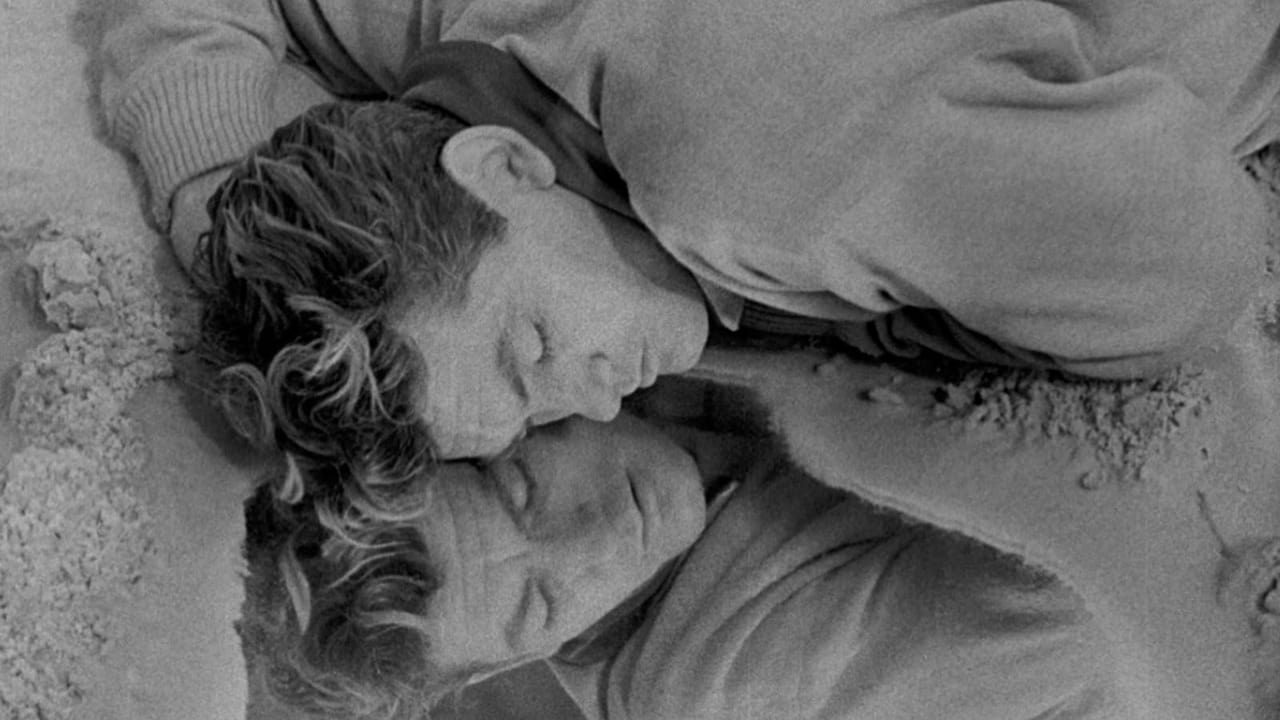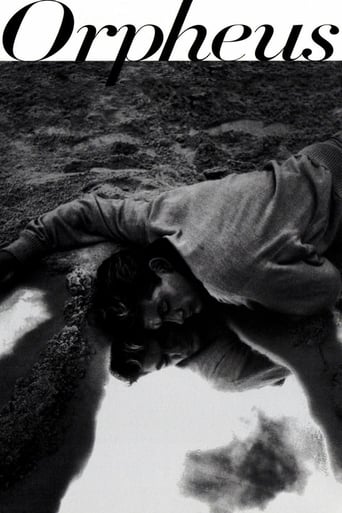ThiefHott
Too much of everything
Freaktana
A Major Disappointment
Robert Joyner
The plot isn't so bad, but the pace of storytelling is too slow which makes people bored. Certain moments are so obvious and unnecessary for the main plot. I would've fast-forwarded those moments if it was an online streaming. The ending looks like implying a sequel, not sure if this movie will get one
Claire Dunne
One of the worst ways to make a cult movie is to set out to make a cult movie.
joeravioli
Man can love death, but death cannot love man; it is as unnatural as man disconnecting himself from life in the pursuit of art and beauty. Man must fear death, just as man must fear losing himself to his aesthetic desires – to create and partake in art. Man must live, and revel in life, as to fall in love with death is akin to looking in the mirror. When one looks into the mirror, one sees their life slip away.Watching Cocteau's Orpheus feels like immersing oneself in a dream. As with dreams, it balances with masterful precision on the fine line between fantasy and reality. It is at once immersive and thought-provoking, richly symbolic and emotionally stirring, and executed with sublime ingenuity. One cannot deny that this film is Cocteau's masterpiece and a work of art that supersedes even celebrated literature in terms of craft and delivery.The film begins by addressing the audience, informing them of the facts of the myth, and stating that the audience can choose to take Cocteau's adaptation and "interpret it as (they) wish," since "a legend is entitled to be beyond time and place". This immediately calls to mind ideas of abstract, surrealist art, the likes of which Cocteau demonstrates having a certain affinity for in his other non-cinematic endeavours. This surrealist undertone is achieved beautifully by Cocteau, as he succeeds in creating a dreamlike atmosphere, both for viewer and Orpheus. While demonstrating a deep knowledge of human emotion and how it is expressed, Cocteau refuses to allow his story to be anchored in reality. He extends the setting to the realm of the deceased, which is represented as an eerie, ruinous landscape that Orpheus is forced to travel through to find Death and Eurydice.The myth as we know is there, but changed – not beyond recognition, however. If anything, Cocteau's adaptation is more intricate than the Greek myth: Instead of traveling to the land of the dead to find Eurydice, he travels to the land of the dead to find Death herself. The film deals with man's desire to create art, comparing it to Death's desire to love man, presenting each as equally damaging. Although Orpheus is spared the suffering by Death's sacrifice, she is forced to bear the brutal punishment that is loss.Themes notwithstanding, Orpheus is an excellent and enjoyable film. It is shot well, acted gorgeously (modern actors would need a page of dialogue to convey the same emotion Maria Casares can with a single smile), and scripted to perfection. My only issue with the film is, as with other films of the period, the soundtrack is terrible, often detracting from potential atmosphere or completely out of place. It isn't too damaging, regarding the film's payoff, but it still interferes with enjoyment.Despite this, Cocteau's Orpheus is a masterpiece. It is art for the sake of art. And that is where its brilliance lies.
Boba_Fett1138
Quite surprised this movie is being listed as a science-fiction movie as well, since this movie really gave me a sci-fi kind of vibe, which was surprising, considering that this is a 1950 movie.It's definitely hard to compare this movie to anything else, since it's being such an unique and also definitely unusual one. It's an old mythological story being set in 'modern' time, making references to currently hot and relevant subjects.I of course can understand some people ending up not liking this movie. It's definitely not a movie that is just for everybody but those who can enjoy and appreciate something completely different and original will most likely end up really liking this movie.The story is being told greatly atmospheric and perfectly mysteriously, which definitely also makes this a tense movie at times. You don't always know what is going on exactly, which keeps you invested all the more in the movie because you want to piece certain aspects together and let things make sense. That's probably what I foremost liked about the movie. It's a thought provoking movie, that perhaps also requires you to have an healthy doze of fantasy.It's a pleasantly told movie. Nothing too pretentious about it but simply a story with a good pace to it and that never gets too heavy or serious. It's not always an easy story to follow but it at least doesn't ever get annoying, or simply just unpleasant to watch in any way.The movie its interesting visuals also help a lot to keep things going and to keep you interested. The movie uses some great early effects and overall the black & white cinematography provides a great atmosphere and style for the movie.Overall a greatly and unique movie, that is not just one for everybody though.8/10 http://bobafett1138.blogspot.com/
dlee2012
This work, arguably Cocteau's finest, transposes the Orpheus myth to a contemporary (though dream-like) setting. Poetry, surrealism and classical mythology blend in an effective and often subtle way as Orpheus struggles to renounce his fixation with Death and reclaim Eurydice from her realm.Notions of what constitutes poetry are questioned throughout. In an inspired move, Cocteau has Orpheus take notes from a "Numbers Station", hinting at the post-War world's obsessive questioning of what actually constitutes art and the paranoia of the emerging Cold War. The character of Orpheus may actually be read to represent a secret agent, rescuing Eurydice from the mysterious realm behind what had just been coined "The Iron Curtain." Death, a doyen of this realm faces trial for treason by a panel of her peers, perhaps a representation of the show trials of the late Stalinist period. Orpheus' infatuation with death is perhaps also a reflection of the mentality of a Cold War spy's coldly murderous ethos. Orpheus' poetry may likewise be as vacuous and ephemeral as the clash of ideologies that prompted the War. Notably, it is when he is denounced as a plagiarist that his infatuation with Death grows, to the point where he no longer cares about Death's opposite, the new life his wife is carrying. He is too blinkered by ideology to see that the child represents the hope of a post-Communist and post-Capitalist future.Entering the mirror world (representing the ideology that is the opposite of his own), Orpheus is presented with a stagnant world of ruins and bureaucrats working to their own agendas, as if time has stood still at the end of the Second World War. This contrasts the relaxed, sun-drenched land of cafés and large modern automobiles in his reality. The numbers stations have entranced him and it is across, into the world of the opposing, "dead" ideology that he enters.Death's helpers are represented as motorcycle police, the very embodiment of the authority of the State and the ideology it represents.As thoughtful as this film is, it has its weaknesses, mostly of a technical nature. Of course, the special effects are primitive to the point of being laughable by today's standards and Marais' acting is weak. Casares does give a fascinating but uneven performance as Death. The films pace also falters at times, undermining the poetic mood that had been so carefully established.Whilst most viewers today will the idea of someone so ruthless and evil as a Cold War spy (of any faction) being presented as a hero to be morally repugnant, particularly in this case as it represents the undermining of the poetic ideal, one must note that Orpheus eventually rejects his infatuation with death and obsession with poetry and returns rescues his wife and child. This, then, can be read, if we follow the allegory to its conclusion, as a rejection of the twin ideologies of Communism and Capitalism and instead looking to a post-ideology future and the traditional values of the family instead of those imposed by either the State or the lure of wealth and fame.
tugrul-anildi
1- A film should convey its meaning mostly not in words but moving pictures, otherwise some other form of expression must be used. If you take out the words from this film, you would be left with careless camera-work and settings (see 1931 film Nosferatu for a much careful camera work and settings- and a much better rising from the coffin scene-19 years earlier). Instead of making a film, Cocteau could publish a book of intellectual sentences decorated with still photography and we would not miss a thing."I am your death" may be an effective sentence by itself, but only in poems. If you use such sentences in a film, you must support it with visual elements in some way. 2- Many positive criticism centers on the symbolism hidden. Somebody symbolizes "poet", other one "death", we see how "poet" prefers art (that is listening to radio) to life, how "poet" is fascinated by "death".... But this is dry symbolism appealing only to the intellect but not meant to be felt. Trying to comprehend the feelings of a "poet" could be good, but instead, we are expected to appreciate his/her drama and "poetic cause". Do watchers feel any emotional contact with the "poet"? I don't think so. That is; film should appeal much much more to senses and emotions than the intellect. 3- Many other positive criticism, on the other hand, mentions innovative camera tricks, etc... You can see all of them in films from much earlier times. For example, rising from bed is done much better in Nosferatu(1931). If careless effects usage was intentional, what was the aim? Some intellectual explanation like "reversal just like from death back to life" might just make me laugh.All in all, we should not make injustice to excellent movies which can alter our emotions by comparing them with self-indulgent appraisal of artistic pain.

